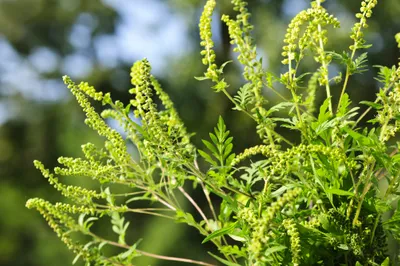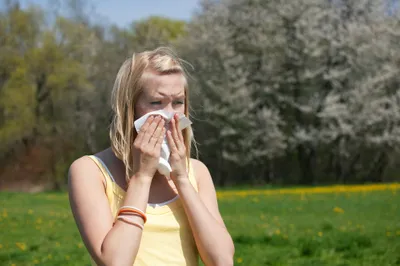August is one of the most enjoyable months of the summer—unless you suffer from ragweed allergies. The pollen from the flowering plant is infamous for causing allergic symptoms (i.e., chronic sneezing, congested, runny nose, and post nasal drip) and rhinitis (or hay fever) in sufferers, particularly in North America.
Luckily, you can survive hay fever season with these eight tips…
1. Recognize the Source
The first, and perhaps the most important, method for steering clear of ragweed is to identify it so you can keep your distance. I had the weed growing in my front garden and assumed it was goldenrod. Ragweed grows in a flowering plant that’s roughly six to 8 inches in height. While goldenrod sprouts pretty golden flowers that birds and honeybees just adore—its pollen is sticky so it doesn’t spread via wind like ragweed’s does. Ragweed, on the other hand, doesn’t sprout bright yellow flowers, and the leaves are split, whereas goldenrod leaves appear in flat connected leaves.
2. Terminate Before Flowering
The most effective way to rid your yard of ragweed is to pull the weeds by the entire root (or they’ll just come back) before they flower. If you plant to weed your own garden and suffer from hay fever, be sure to wear protective, long pants and a long-sleeve shirt, garden gloves, a face mask, and even goggles if you have them.
3. Keep a Simple Lawn
Having a nice front lawn doesn’t mean you have to have lush, green grass or even a flowering garden. Many allergy sufferers prefer to plant a few bushes or trees to surround with rocks, gravel, patio stones, or mulch to keep weeding (and mowing) low maintenance.
4. Call in the Professionals
If you suffer from severe hay fever, weeding your own garden is likely out of the question. Instead, call in the professionals. Not only will hiring a professional lawn maintenance company save you from becoming a congested mess—it will ensure ragweed is removed completely and properly so that it doesn’t reappear.
5. Install Air Conditioning
You may be able to control ragweed at your own house, but not in your neighborhood or on your commute to work. However, installing air conditioning so you can keep house windows closed may prevent pollen from entering your home. You can also use AC in the car to keep allergy symptoms manageable.
6. Be Proactive
Just because your eyes haven’t started itching and your nose hasn’t started running doesn’t mean you can’t start popping over-the-counter allergy meds to keep hay fever symptoms at bay. You can also start prescription nasal steroids, oral antihistamines, and allergy eye drops a few weeks in advance as a preventative measure.
7. Keep Pets Clean
I know Fido and Fifi love going on outdoor adventures, but when they return they bring home more than Disney-worthy stories. During allergy season, your pets are a prime source of pollen entering your home. So if they do go outside, brush, towel off, and bathe them regularly to prevent them tracking pollen into your home and bed (if they sleep with you).
8. Monitor Pollen Counts
Another preventative measure for avoiding pollen as much as possible is to keep an eye on local pollen counts in your area. If you can, try to avoid being outside too much on hot, humid days when pollen is extremely plentiful. Monitor local news or check the pollen count in your area using the American Academy of Allergy, Asthma, and Immunology’s online tracker.











